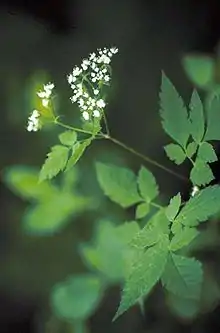Osmorhiza
Osmorhiza is a genus of perennial herbs, known generally as sweet cicely, sweetcicely, or sweetroot. Most species are native to North America, but some grow in South America and Asia. Some species are used for medicinal purposes, but have dangerous lookalikes. The fruits of this plant have barbs on the end allowing them to stick to clothing, fur, or feathers.
| Osmorhiza | |
|---|---|
 | |
| Osmorhiza claytonii | |
| Scientific classification | |
| Kingdom: | Plantae |
| Clade: | Tracheophytes |
| Clade: | Angiosperms |
| Clade: | Eudicots |
| Clade: | Asterids |
| Order: | Apiales |
| Family: | Apiaceae |
| Subfamily: | Apioideae |
| Tribe: | Scandiceae |
| Subtribe: | Scandicinae |
| Genus: | Osmorhiza Raf. 1819 |
| Species | |
|
See text | |
American Indians used the roots of sweet cicely as a panacea; tonic for upset stomach, to ease child birth; the root was poulticed on boils, and wounds; root tea as an eye wash. Folk medicine uses include, an expectorant, tonic for coughs and for stomachaches.[1]
Species
- Osmorhiza aristata
- Osmorhiza berteroi (Tapering sweetroot, mountain sweet cicely, mountain sweetroot)
- Osmorhiza brachypoda (California sweet cicely)
- Osmorhiza claytonii (Clayton's sweetroot, sweet cicely)
- Osmorhiza depauperata (Bluntseed sweetroot)
- Osmorhiza glabrata
- Osmorhiza longistylis (American sweet cicely, sweet cicely, white cicely, longstyle sweetroot, aniseroot, licorice root, or wild anise)
- Osmorhiza mexicana (Mexican sweet cicely)
- Osmorhiza occidentalis (Western sweetroot)
- Osmorhiza purpurea (Purple sweetroot)
References
- Peterson Field Guides (Eastern/Central Medicinal Plants and Herbs)
This article is issued from Wikipedia. The text is licensed under Creative Commons - Attribution - Sharealike. Additional terms may apply for the media files.